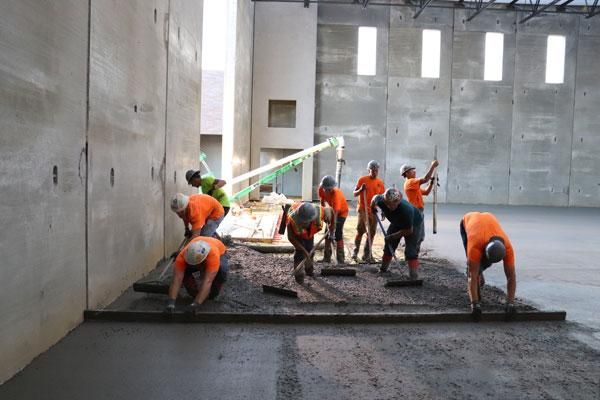Concrete Crew Bedford TX utilize a variety of techniques and tools to achieve desired finishes, textures, and levels of smoothness.

Here’s an in-depth look at the techniques commonly used by concrete crews for finishing concrete surfaces:
- Screeding:
- Screeding is the initial step in finishing concrete surfaces, where crews use a screed board or straightedge to level and smooth the concrete to the desired elevation. The screed board is dragged across the surface in a back-and-forth motion to remove excess concrete and fill low spots, ensuring a uniform surface.
- Bull Floating:
- After screeding, crews use a bull float to further level and smooth the surface of the concrete. The bull float, typically made of wood, aluminum, or magnesium, is pushed or pulled across the surface to fill voids, remove imperfections, and bring excess water and cement paste to the surface.
- Edging:
- Edging involves creating rounded edges along the perimeter of the concrete slab using an edging tool or hand trowel. Crews run the edging tool along the edges of the concrete, creating a smooth, rounded profile that enhances the appearance and prevents chipping or spalling.
- Jointing:
- Jointing is the process of creating control joints or contraction joints in the concrete to control cracking caused by shrinkage and temperature changes. Crews use a grooving tool or jointer to create straight or patterned joints at regular intervals, typically every 8 to 12 feet, depending on the slab’s thickness and dimensions.
- Floating:
- Floating is performed after bull floating to further smooth and compact the surface of the concrete. Crews use hand floats or power floats to float the surface in a circular motion, closing surface voids and producing a dense, uniform finish. Floating also helps enhance surface durability and resistance to wear and abrasion.
- Troweling:
- Troweling is the final step in finishing concrete surfaces, where crews use steel trowels to create a smooth, polished surface. Crews may use hand trowels for small areas or power trowels for larger areas. Troweling compacts the surface, closes surface pores, and imparts a glossy sheen to the concrete.
- Broom Finishing:
- Broom finishing is a non-slip surface treatment commonly used for exterior concrete surfaces such as driveways, sidewalks, and patios. Crews use a coarse-bristled broom to sweep the surface of the concrete in parallel strokes, creating a textured finish that enhances traction and prevents slipping.
- Stamping:
- Stamping is a decorative finishing technique that involves imprinting patterns, textures, or designs onto the surface of the concrete. Crews use stamping mats or texture skins to press into the surface of the concrete, creating the appearance of natural materials such as brick, stone, or wood.
- Coloring and Staining:
- Coloring and staining are techniques used to enhance the appearance of concrete surfaces by adding pigments or dyes to the concrete mix or applying stains and dyes to the surface. Crews use sprayers, brushes, or rollers to apply colorants or stains, creating vibrant, customized finishes that complement the surrounding environment.
- Sealing and Curing:
- Sealing and curing are essential steps in finishing concrete surfaces to protect them from moisture penetration, staining, and deterioration. Crews apply concrete sealers or curing compounds to the surface of the concrete, forming a protective barrier that enhances durability and prolongs the lifespan of the concrete.
Concrete Crew Bedford TX Attention to detail, skillful execution, and proper timing are essential for achieving high-quality finishes that enhance the durability, appearance, and performance of concrete structures.
Bedford Concrete Crew
2301 Central Dr, Bedford, TX 76021, United States
1-817-859-6661

Leave a Reply